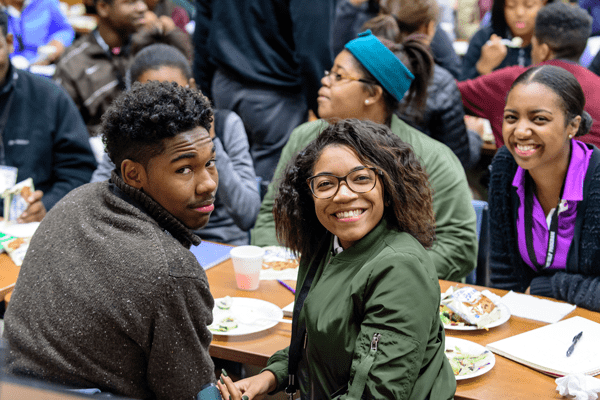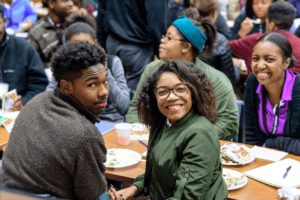July 21, 2022

 Being a young student in Detroit, I attended Detroit Public Schools for elementary and middle school during a time when school funding was very limited. Though I made great memories and still reflect on those positive moments spent during my days as a student, I also reflect on the lack of resources that were available. I often think about the students who did not have access to privileges such as transportation, school lunches, or quality tutoring resources and how that affected their growth as a student.
Being a young student in Detroit, I attended Detroit Public Schools for elementary and middle school during a time when school funding was very limited. Though I made great memories and still reflect on those positive moments spent during my days as a student, I also reflect on the lack of resources that were available. I often think about the students who did not have access to privileges such as transportation, school lunches, or quality tutoring resources and how that affected their growth as a student.
Funding was still limited by the time I entered high school, especially when compared to predominantly white or middle-class neighborhoods. This lack of funding created educational gaps, making it difficult for some students when it came to graduation and college acceptance. Fortunately, in my senior year of high school, I had the honor to be a part of an extraordinary program that gave me a new outlook on life and was great preparation for pursuing a successful college career. The Midnight Golf Program (MGP) is an organization that values the development of youth in the city of Detroit and metro Detroit. Led by Renee Fletcher, MGP has been an impactful resource to increase the graduation rates of high school students while connecting them with college and work opportunities.
To this day, I still reference the speakers that were a part of the MGP 2019 cohort such as Dave Gamlin. I recall him saying, “You will never get what you deserve, you only get what you negotiate.” These lessons have helped me throughout college. Furthermore, MGP helped navigate seniors through the college application process. The annual Roadtrip to Success was a great opportunity to learn about schools outside of Michigan, such as Vanderbilt University, Texas A&M University, and other schools down south. Students were able to access reduced application fees, impromptu interviews, scholarships, and internships throughout the trip.
Aside from the academic outlet, students were also able to practice the golf skills that were taught to them by professional golfers throughout the academic year on quality golf courses. This is a very important aspect of the program considering that most students in the program probably never played on an actual golf course. As the program came to an end, many students were able to carry these experiences into their young adulthood and implement the learnings into their personal development.
 One of the main elements of Midnight Golf is mentorship. People who pursue various professions volunteer as a mentor to connect with students two days out of the week during the student’s school year. This commitment is significant to the member’s experience because it helps them create a sustainable relationship with people they can look up to and learn from. I had the honor to interview one of my mentors from the 2019 cohort, Winston Coffee, about his work with the Midnight Golf Program. Aside from being a volunteer mentor, Coffee works as a college liaison whose job is to cultivate relationships with various universities to earn landing spots for the members of the program. The long-term goal is to form a financial partnership with these universities so students can have direct access to scholarship incentives upon acceptance to that university.
One of the main elements of Midnight Golf is mentorship. People who pursue various professions volunteer as a mentor to connect with students two days out of the week during the student’s school year. This commitment is significant to the member’s experience because it helps them create a sustainable relationship with people they can look up to and learn from. I had the honor to interview one of my mentors from the 2019 cohort, Winston Coffee, about his work with the Midnight Golf Program. Aside from being a volunteer mentor, Coffee works as a college liaison whose job is to cultivate relationships with various universities to earn landing spots for the members of the program. The long-term goal is to form a financial partnership with these universities so students can have direct access to scholarship incentives upon acceptance to that university.
The Midnight Golf Program and Let’s Detroit both contribute to the long-lasting development of the city of Detroit. Both organizations are used to further drive economic sustainability for their residents while also connecting people to ways to achieve life purpose fulfillment.
Read more from my interview with Coffee below.
Lessons he named included dining etiquette, general golf knowledge, and soft skills such as networking and investing.
The founder and president of the Midnight Golf Program, Renee Fluker, had a son who played golf, and she saw the opportunities and benefits it bought to his career. Though he loved the sport, he was frustrated because he never saw people who looked like him in the sport.
“Golf offers you a lot of time to discuss potential business deals. Young people of color need exposure to the game so when those opportunities arise, they won’t be lost; they would be eager to take advantage of them,” said Coffee.
Coffee recognizes that big corporations have done a good job at bringing jobs to residents. He said that Detroit could invest more into the entertainment and social side of things.
“If a young person isn’t working, he’s looking to have some fun. If you want smart young minds to reside in Detroit, you have to entice them with entertainment and fun, or else they’re going to go find that in New York, Atlanta, etc.,” said Coffee.
Written by Kennedi Smith, Spring 2022 Let’s Detroit Campus Ambassador
Applications for the Fall 2022 Campus Ambassador cohort are now open. Learn more and apply.